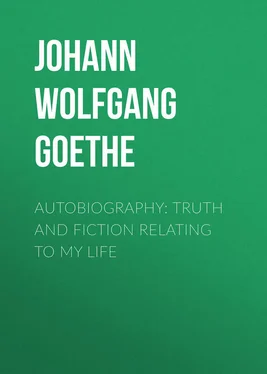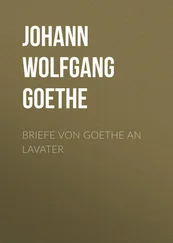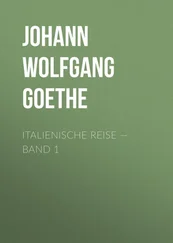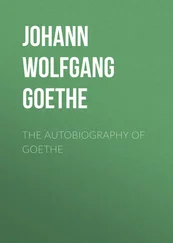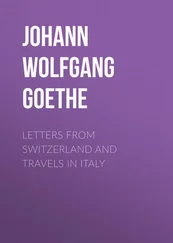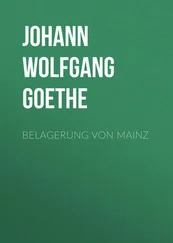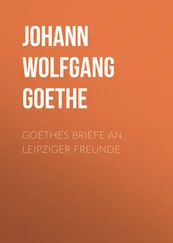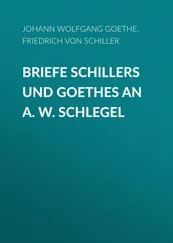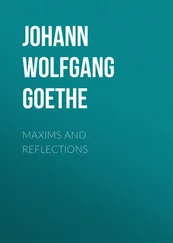Johann von Goethe - Autobiography - Truth and Fiction Relating to My Life
Здесь есть возможность читать онлайн «Johann von Goethe - Autobiography - Truth and Fiction Relating to My Life» — ознакомительный отрывок электронной книги совершенно бесплатно, а после прочтения отрывка купить полную версию. В некоторых случаях можно слушать аудио, скачать через торрент в формате fb2 и присутствует краткое содержание. Жанр: foreign_antique, foreign_prose, на английском языке. Описание произведения, (предисловие) а так же отзывы посетителей доступны на портале библиотеки ЛибКат.
- Название:Autobiography: Truth and Fiction Relating to My Life
- Автор:
- Жанр:
- Год:неизвестен
- ISBN:нет данных
- Рейтинг книги:5 / 5. Голосов: 1
-
Избранное:Добавить в избранное
- Отзывы:
-
Ваша оценка:
- 100
- 1
- 2
- 3
- 4
- 5
Autobiography: Truth and Fiction Relating to My Life: краткое содержание, описание и аннотация
Предлагаем к чтению аннотацию, описание, краткое содержание или предисловие (зависит от того, что написал сам автор книги «Autobiography: Truth and Fiction Relating to My Life»). Если вы не нашли необходимую информацию о книге — напишите в комментариях, мы постараемся отыскать её.
Autobiography: Truth and Fiction Relating to My Life — читать онлайн ознакомительный отрывок
Ниже представлен текст книги, разбитый по страницам. Система сохранения места последней прочитанной страницы, позволяет с удобством читать онлайн бесплатно книгу «Autobiography: Truth and Fiction Relating to My Life», без необходимости каждый раз заново искать на чём Вы остановились. Поставьте закладку, и сможете в любой момент перейти на страницу, на которой закончили чтение.
Интервал:
Закладка:
It may deserve to be mentioned here that Meister, at its first appearance in Germany, was received very much as it has been in England. Goethe's known character, indeed, precluded indifference there; but otherwise it was much the same. The whole guild of criticism was thrown into perplexity, into sorrow; everywhere was dissatisfaction open or concealed. Official duty impelling them to speak, some said one thing, some another; all felt in secret that they knew not what to say. Till the appearance of Schlegel's /Character/, no word, that we have seen, of the smallest chance to be decisive, or indeed to last beyond the day, had been uttered regarding it. Some regretted that the fire of /Werter/ was so wonderfully abated; whisperings there might be about 'lowness,' 'heaviness;' some spake forth boldly in behalf of suffering 'virtue.' Novalis was not among the speakers, but he censured the work in secret, and this for a reason which to us will seem the strangest; for its being, as we should say, a Benthamite work! Many are the bitter aphorisms we find, among his Fragments, directed against /Meister/ for its prosaic, mechanical, economical, coldhearted, altogether Utilitarian character. We English again call Goethe a mystic; so difficult is it to please all parties! But the good, deep, noble Novalis made the fairest amends; for notwithstanding all this, Tieck tells us, if we remember rightly, he continually returned to /Meister/, and could not but peruse and reperuse it.
Goethe's /Wanderjahre/ was published in his seventy-second year; /Werter/ in his twenty-fifth; thus in passing between these two works, and over /Meister's Lehrjahre/ which stands nearly midway, we have glanced over a space of almost fifty years, including within them, of course, whatever was most important in his public or private history. By means of these quotations, so diverse in their tone, we meant to make it visible that a great change had taken place in the moral disposition of the man; a change from inward imprisonment, doubt and discontent, into freedom, belief and clear activity; such a change as, in our opinion, must take place, more or less consciously, in every character that, especially in these times, attains to spiritual manhood, and in characters possessing any thoughtfulness and sensibility, will seldom take place without a too painful consciousness, without bitter conflicts, in which the character itself is too often maimed and impoverished, and which end too often not in victory, but in defeat, or fatal compromise with the enemy. Too often, we may well say; for though many gird on the harness, few bear it warrior-like; still fewer put it off with triumph. Among our own poets, Byron was almost the only man we saw faithfully and manfully struggling, to the end, in this cause; and he died while the victory was still doubtful, or at best, only beginning to be gained. We have already stated our opinion, that Goethe's success in this matter has been more complete than that of any other man in his age; nay, that, in the strictest sense, he may almost be called the only one that has so succeeded. On this ground, were it on no other, we have ventured to say that his spiritual history and procedure must deserve attention; that his opinions, his creations, his mode of thought, his whole picture of the world as it dwells within him, must to his contemporaries be an inquiry of no common interest; of an interest altogether peculiar, and not in this degree exampled in existing literature. These things can be but imperfectly stated here, and must be left, not in a state of demonstration, but at the utmost, of loose fluctuating probability; nevertheless, if inquired into, they will be found to have a precise enough meaning, and, as we believe, a highly important one.
For the rest, what sort of mind it is that has passed through this change, that has gained this victory; how rich and high a mind; how learned by study in all that is wisest, by experience in all that is most complex, the brightest as well as the blackest, in man's existence; gifted with what insight, with what grace and power of utterance, we shall not for the present attempt discussing. All these the reader will learn, who studies his writings with such attention as they merit; and by no other means. Of Goethe's dramatic, lyrical, didactic poems, in their thousandfold expressiveness, for they are full of expressiveness, we can here say nothing. But in every department of Literature, of Art ancient and modern, in many provinces of Science, we shall often meet him; and hope to have other occasions of estimating what, in these respects, we and all men owe him.
Two circumstances, meanwhile, we have remarked, which to us throw light on the nature of his original faculty for Poetry, and go far to convince us of the Mastery he has attained in that art: these we may here state briefly, for the judgment of such as already know his writings, or the help of such as are beginning to know them. The first is his singularly emblematic intellect; his perpetual never-failing tendency to transform into /shape/, into /life/, the opinion, the feeling that may dwell in him; which, in its widest sense, we reckon to be essentially the grand problem of the Poet. We do not mean mere metaphor and rhetorical trope: these are but the exterior concern, often but the scaffolding of the edifice, which is to be built up (within our thoughts) by means of them. In allusions, in similitudes, though no one known to us is happier, many are more copious than Goethe. But we find this faculty of his in the very essence of his intellect; and trace it alike in the quiet cunning epigram, the allegory, the quaint device, reminding us of some Quarles or Bunyan; and in the /Fausts/, the /Tassos/, the /Mignons/, which in their pure and genuine personality, may almost remind us of the /Ariels/ and /Hamlets/ of Shakespeare. Everything has form, everything has visual existence; the poet's imagination /bodies forth/ the forms of things unseen, his pen turns them to /shape/. This, as a natural endowment, exists in Goethe, we conceive, to a very high degree.
The other characteristic of his mind, which proves to us his acquired mastery in art, as this shows us the extent of his original capacity for it, is his wonderful variety, nay universality; his entire freedom from the Mannerism. We read Goethe for years, before we come to see wherein the distinguishing peculiarity of his understanding, of his disposition, even of his way of writing, consists. It seems quite a simple style that of his; remarkable chiefly for its calmness, its perspicuity, in short its commonness; and yet it is the most uncommon of all styles: we feel as if every one might imitate it, and yet it is inimitable. As hard is it to discover in his writings, – though there also, as in every man's writings, the character of the writer must lie recorded, – what sort of spiritual construction he has, what are his temper, his affections, his individual specialties. For all lives freely within him: Philina and Clanchen, Mephistopheles and Mignon, are alike indifferent, or alike dear to him; he is of no sect or caste: he seems not this man or that man, but a man. We reckon this to be the characteristic of a Master in Art of any sort; and true especially of all great Poets. How true is it of Shakespeare and Homer! Who knows, or can figure what the Man Shakespeare was, by the first, by the twentieth perusal of his works? He is a Voice coming to us from the Land of Melody: his old brick dwelling- place, in the mere earthly burgh of Stratford-on-Avon, offers us the most inexplicable enigma. And what is Homer in the /Ilias/? He is THE WITNESS; he has seen, and he reveals it; we hear and believe, but do not behold him. Now compare, with these two Poets, any other two; not of equal genius, for there are none such, but of equal sincerity, who wrote as earnestly and from the heart, like them. Take, for instance, Jean Paul and Lord Byron. The good Eichter begins to show himself, in his broad, massive, kindly, quaint significance, before we have read many pages of even his slightest work; and to the last he paints himself much better than his subject. Byron may also be said to have painted nothing else than himself, be his subject what it might. Yet as a test for the culture of a Poet, in his poetical capacity, for his pretensions to mastery and completeness in his art, we cannot but reckon this among the surest. Tried by this, there is no writer that approaches within many degrees of Goethe.
Читать дальшеИнтервал:
Закладка:
Похожие книги на «Autobiography: Truth and Fiction Relating to My Life»
Представляем Вашему вниманию похожие книги на «Autobiography: Truth and Fiction Relating to My Life» списком для выбора. Мы отобрали схожую по названию и смыслу литературу в надежде предоставить читателям больше вариантов отыскать новые, интересные, ещё непрочитанные произведения.
Обсуждение, отзывы о книге «Autobiography: Truth and Fiction Relating to My Life» и просто собственные мнения читателей. Оставьте ваши комментарии, напишите, что Вы думаете о произведении, его смысле или главных героях. Укажите что конкретно понравилось, а что нет, и почему Вы так считаете.
